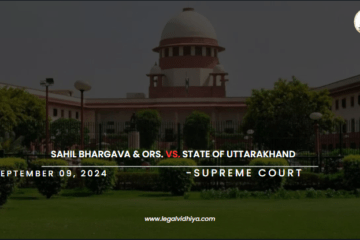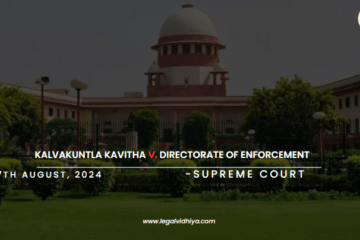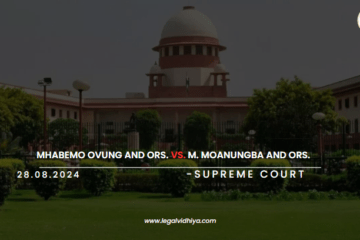
| Citation | 2023 SCC Online SC 746 |
| Date of Judgement | July 17, 2023 |
| Court | The Supreme court of India |
| Case Type | Criminal Appeal |
| Appellant | Central Bureau of Investigation (CBI) |
| Respondent | Shyam Bihari |
| Bench | Hon’ble Justices B.V. Nagarathna and Manoj Mishra |
FACTS OF THE CASE
This appeal was brought before the Supreme court of India assailing the judgement and order of the High court of Punjab & Haryana dated 01.05.2012, criminal Appeal no. 372 of 2002. The appellant in the aforesaid criminal Appeal no. was Kewal Krishan who was charged under section 302 IPC, whereby his conviction and sentencing of the order of trial court has been set aside was acquitted by the High court of the charges he was tried with.
It is a case of culpable homicide amounting to murder under section 300 of IPC. The deceased was supposedly a friend of the accused (Kewal Krishan), he was last seen alive with the accused in his own house on 10.12.1998. Later on, his body was found with multiple injuries in his house only, by his nephew on 12.12.1998. The autopsy report reflected that the deceased was dead because of shock and hemorrhage, due to an ante mortem incised wound within two days. Kewal made an extra judicial confession before a person on 25.12.1998 and was arrested by the police on that day only. He made a disclosure which led to the discovery of the murder weapon, that he hid, is Khanjar( knife). The incised wound can be a result caused by the same kanjar according to the autopsy surgeon. As per the circumstances and the evidence, hereby the murder weapon, the trial court convicted and sentenced the accused accordingly.
The appeal of the aggrieved party hereby accused was filed before the High court of Punjab & Haryana where the court observed that Kewal has denied the incriminating circumstances and claimed that he was arrested on 12.12.1998 itself on false implication. Later on, it was found by the High court that the police was malafide in the procedure and after the statement made by the person who last saw the accused and deceased alive, the police had arrested Kewal 12.12.1998 and not 25.12.1998. The court further observed that the person who had seen them together, was a set up and not a fair witness, his statement was not convincing and reliable. Also, the last seen circumstances can not prove the guilt of the accused by excluding all hypotheses consistent with his innocence. With respect to the murder weapon i.e. khanjar, the court said that there is no proof and serologist report that the knife had the deceased’s blood upon it. Thus, the high court acquitted the accused.
ISSUE RAISED:
Before the supreme court of India the issue raised were:
- Whether merely on the basis of circumstantial evidence can a conviction be passed?
- Whether Art. 136 of the Indian constitution permits the Supreme court to interfere with an order of acquittal passed by the High court while reversing an order of conviction recorded by the trial court?
ARGUMENTS:
The prosecution argued on the basis of the circumstances that the deceased was last seen alive in his own house with the accused. Also a murder weapon, here, khanjar was found after the disclosure of the accused. According to the opinion of the autopsy surgeon the incised wound can be a result of the khanjar.
The respondent argued that Kewal was arrested on 12.12.1998 but as per the police report he was arrested on 25.12.1998 after he made that extra judicial confession. It was submitted by the respondent that there is no straight facts and reliable evidence to prove that Kewal has committed such an offence and thus should not be convicted for the same.
JUDGEMENT:
The Supreme court firstly observed that, the High court has not found any incriminating circumstances to prove beyond reasonable doubt and also the circumstances does not constitute a chain so complete as to indicate that the offence in all human probability is committed by accused and no one else, hence set aside the order of the trial court and acquitted the accused.
The court held that, it would be not fair to not notice the law as to when it would be appropriate for this court, to interfere with acquittal order passed by the High court while reversing the order of conviction and sentence of the trial court, by exercising the power under Art. 136 of the Indian constitution. The court further said that the law in this regard is well settled. Usually, the court does not interfere with the High court order of acquittal but when it comes to the erroneous or any wrong process in reasoning of the High court then the supreme court has to interfere to prevent the grave miscarriage of the law. (Refer: State of UP v. Sahai). They support the above reiteration, the court further gave reference of the case of State of MP v. Paltan Mallah, where it was held that “this court would be slow in interfering with the findings of the High court, unless there is perverse appreciation of the evidence which resulted in serious miscarriage of justice.”
In the above light of view, the court said that they have to examine as to whether the high court has avoided or ignored any material fact/ evidence which has resulted in serious miscarriage of justice. Whether it was a plausible view taken up by the High court.
Resolving the issue, whether on the basis of circumstantial evidence can a person be convicted. The court held that, it is trite law that if a person is to be convicted on the basis of circumstantial evidence then the prosecution must prove beyond all the human reasonable doubt which a man of ordinary prudence can think of. The circumstances relied upon the facts must be of such a high tendency unerringly pointing towards the accused’s guilt without any doubt and must form a chain of action connecting the intention, act and the arised circumstances of a particular incident and there has to be no escape from the conclusion that the act is done by none other than the accused and an innocent is not bearing any harm.
After observing all the evidences and facts of the case present before the Supreme court of India, the Hon’ble bench held that the incriminating circumstances of this particular case doesn’t proved beyond reasonable doubt and a chain to form it, is incomplete to certain the degree that the offence is committed by the accused an no one else can not be considered here. For all the reasons above, keeping in mind the view taken up by the High court and acquitting the accused was of plausible view and was not pointed out that any material fact is being ignored here. Thus, the court refused to interfere with the order of the High court, and accordingly the appeal is Dismissed.
This Article is written by Deepanshi Srivastava of Shambhunath Institute of Law, Intern at Legal Vidhiya.




0 Comments